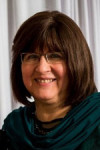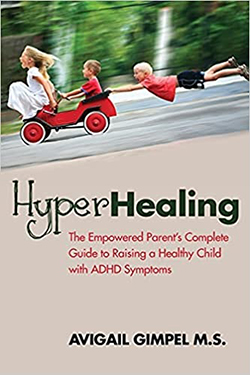By Toby Klein Greenwald

 EFRAT, Israel — This last year has been challenging while parents struggled with home-schooling their children through COVID, and especially so when the children have extra issues with which to deal, among them, ADHD.
EFRAT, Israel — This last year has been challenging while parents struggled with home-schooling their children through COVID, and especially so when the children have extra issues with which to deal, among them, ADHD.
When I heard that Avigail Gimpel was writing a book, called HyperHealing, The Empowered Parent’s Complete Guide to Raising a Healthy Child with ADHD Symptoms, I knew from the subtitle that this was going to be an out-of-the-box book, by referring to their behavior as “symptoms” and not “children with ADHD.”
I had a special interest, firstly because I taught kids who had been diagnosed with ADHD (and with learning disabilities) on and off for almost 40 years, both in mainstream classrooms and in specialized frameworks, and secondly, because I actually taught one of Gimpel’s sons, and directed one of her daughters in a theater production. They were both bright, creative, fun and helpful kids, so – contrary to the platitude of “the shoemaker’s children go barefoot” – I knew that here was a professional who, in her family life, had also done something right. And I share the fact that I taught/directed them with their permission; they are both adults now.
Gimpel’s book is a must read not just for every educator, but for every parent, because some of the solutions she offers for children given the ADHD label by teachers and testers, can and should be adopted by everyone. In a 400-page book (with more than 12 pages of bibliography) she dedicates the first section, written with great sensitivity and insight, to the parents themselves, calling it “Powerful Parenting – Let’s Begin with Us,” whose goal is to help parents understand their own issues and challenges and how to deal with them, as they relate to child-raising, before they begin to wrap their heads around the specific gift of ADHD. I write “gift” not as a euphemism, but to quote something I said more than 20 years ago at an event for a school specializing in teaching boys diagnosed with ADHD: “If I had to be on a desert island with no way off, I’d want to be with a group of these kids, because they would find a way off; they would rescue us.”
Gimpel brings to the table more than 25 years during which she has been involved in the research, development and application of, she claims, cutting-edge intervention programs for her clients, for hundreds of students, and for her own children. She has a Masters degree in Special Education, Certification in Special Education with a focus in Dyslexia, and Certification in Instrumental Enrichment and MLE, from the prestigious Feuerstein Institute in Jerusalem.
Part One of HyperHealing is about communication, rule setting and discipline, and in our overmedicated society, one of her opening statements could be the mantra of every mother and father: “The problem does not reside within my child, but rather in the clash of her personality with her environment.” Gimpel says we have to learn to overcome some of our assumptions, and not to fear leaving our comfort zone – whether our own, or our children’s. Through her engaging text — filled with citations of important studies, and liberally sprinkled with her personal family stories and stories of others (quoted anonymously) — we learn to view behaviors through a new prism. “An instant gratification personality type may struggle in school,” she writes, “but in that same competitive job, she may persevere and teach her friend to be spontaneous and take risks.” In addition to experts in education and psychology, she quotes Rabbi Jonathan Sacks, who wrote, ‘Children grow to fill the space we create for them, and if it’s big, they grow tall.”
Every chapter concludes with an “Action Plan” that gives explicit operative suggestions, and a “Cheat Sheet” that summarizes the previous chapter. Since the people reading this book are probably parents, and some say there is a genetic element to ADHD, it’s an excellent idea to offer these shorter, concise segments to her readers.
Gimpel reminds us of the gift of these “instant gratification” children. “She is the entrepreneur, artist, scientist, actor, builder, high-tech person…” Yet, she directs one to strategies on how to set boundaries, and how to discipline wisely, even including, when necessary, punishments. One of the four important decisions every parent must make, she writes, is, “Decide to see our child as a healthy child who is capable of learning to behave like a civilized person.” She discusses the importance of helping our children to break unhealthy “habit loops” and replace them with constructive ones. She urges parents to identify their own “engines” – the cause of their decision-making process, and recognizes that we need to heal our own painful patterns, as “our bodies hold onto past traumas” that may, in turn, influence our relationship with our children. She reminds parents to put on their “oxygen mask” first, and find ways to destress.
Though children given the ADHD label have a special set of challenges, especially if parents have been convinced that they should have low expectations for that child, Gimpel points out that “Even a positive label can set a person on the path toward a fixed mindset” and can lead to problems. She quotes a fascinating study conducted by Carol Dweck in which children who were told at the conclusion of a test, “You must be really smart” did not do as well on subsequent tests as children who were told, “You must have worked very hard.” The first group began to reject challenges. A very moving story, especially to those of us who are Israeli parents, is how her son, after not being accepted into a coveted army unit equivalent to the US Navy Seals, took a few days off at the beach, and then said, “I am going to be the very best combat soldier in whatever unit I am placed.” He rejected a victim mentality, saying, “I’m just starting from a different place than I expected.” He had internalized the secret, she writes, “that we grow and learn from every situation.”
Part Two, “Healthy Habit Formation: Now It’s Our Child’s Turn,” invites the child to “take the leading role in his HyperHealing program.”
Gimpel tells parents to be enthusiastic, be specific, say it right away, and don’t add a “but” if you are giving a compliment. She advises on how to help children develop healthy habits, how to reward them wisely, and how to teach children life skills, like how to divide tasks into parts and how to establish successful routines. She also advises on how to help them acquire emotional and social skills, how to help them achieve appropriate verbal behavior, how to help them make giving a part of their lives, and much more. She advises parents to “practice asking questions…set small goals…study body language,” and urges parents to “put the phone down” and give undivided attention to their children when they come home, even if it is sometimes only ten minutes.
Gimpel commiserates with parents who have sat in frustrating parent-teacher meetings, and offer ideas on how to make those meetings more successful and productive, and how to avoid misunderstandings. Here, again, are ideas that can be adopted by all parents.
In Part Three, “Check the Environment,” Gimpel gives attention to the issues of nutrition, sleep problems and screen addiction. She cites numerous studies that indicate the effect that these issues have on the child’s ability to function successfully. She also offers suggestions for how to make things better, which include, for example, the “Thirty-Day Challenge” relating to nutrition. She writes about vitamins, physical activity, sunshine, nature and – in the school setting — the importance of recess. One school at which I taught was located in a pastoral kibbutz setting. If I felt a student needed a few minutes to settle down, rather than admonishing him, I told him to take a ten-minute walk in nature. It worked every time.
Gimpel suggests that the whole family participate in these efforts, or a close friend or neighbor, so the child or family will not be in it alone.
Oh, and that school about whose students I wrote that if I were on a desert island, I’d want to be with a group of those kids, because they would get us rescued? One of them, more than 20 years later, raises dogs trained to search and rescue, and his services are employed by the army. My unwitting prophecy fulfilled.
Gimpel’s book offers not just excellent advice to teachers and parents, but validation to those of us who always knew that each of our children and students, whatever their challenges or idiosyncrasies, is a true gift.
*
The author is an award-winning journalist, director of Raise Your Spirits Theatre, a veteran educator and editor-in-chief of WholeFamily.com